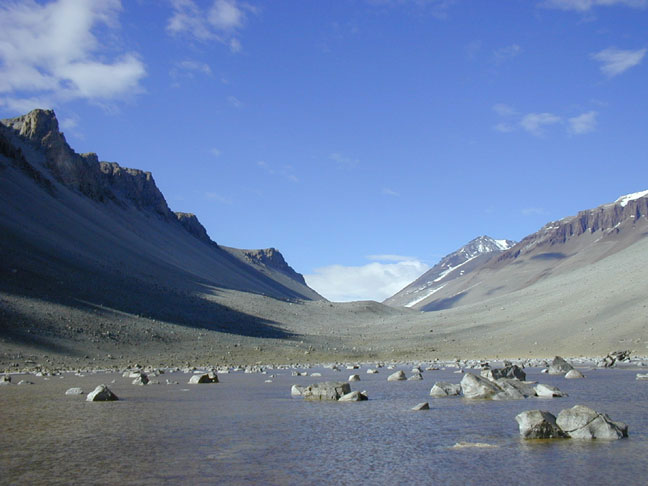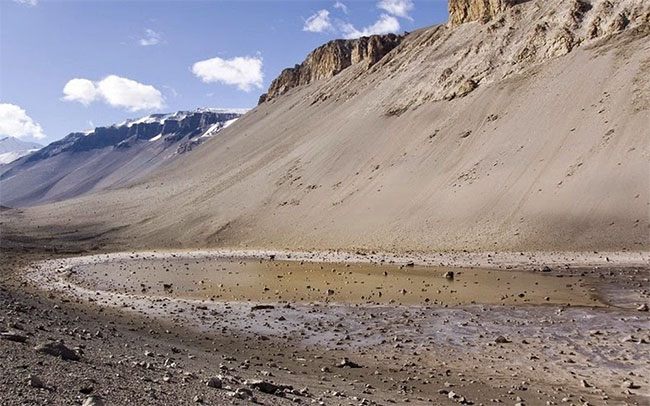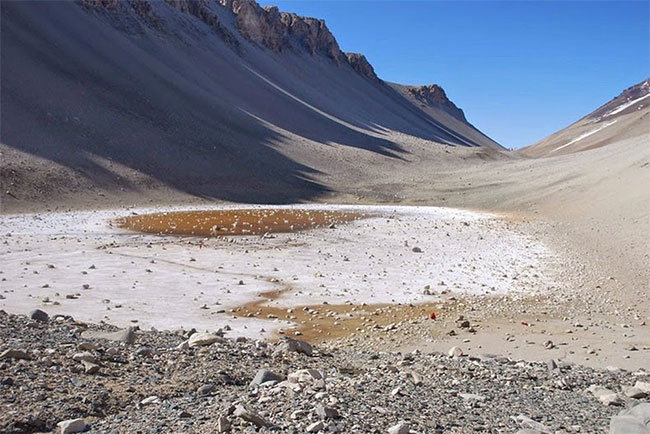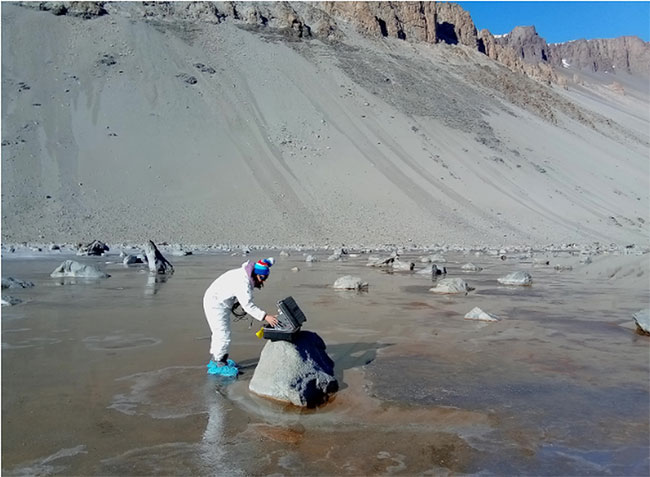The world's 'strange' lake: In the coldest place in Antarctica, even minus 50 degrees can't freeze
Scientists have always wondered that Lake Don Juan is in the coldest and driest part of Antarctica, but even though the temperature drops to minus 50 degrees Celsius, the lake water does not freeze.
Never freezes even though the temperature drops to minus 50
At the foot of the Transantarctic Mountains (the rocky mountain range that rises and extends along the South Pole) in the dry McMurdo valley in Antarctica there is a very strange lake. It's Lake Don Juan . Lake Don Juan was first discovered in 1961. It is named after the expedition's helicopter pilots Donald Roe and John Hickey.
Even in winter, nearly everything in Antarctica freezes, except for Lake Don Juan. More specifically, in the arid conditions of Antarctica with an annual rainfall of only 50 mm, scientists have not been able to determine where Lake Don Juan gets its water supply.

Lake Don Juan is a strange lake, even though the temperature is minus 50 degrees Celsius, it still does not freeze.
Although Lake Don Juan is twice the size of an Olympic swimming pool and 10cm deep, it is extremely famous around the world. Even though it's just over 10 centimeters deep, Lake Don Juan looks more like a puddle of white liquid than a lake. Therefore, scientists from the University of Washington decided to go to Lake Don Juan to determine exactly what its water has that even though the temperature is low, it still does not freeze.
"Lake Don Juan is very special," said Ronald Sletten, a professor in the Department of Earth Sciences at the University of Washington .
Sletten and his team spent six weeks in Antarctica studying Lake Don Juan, its flow, and its surroundings. For the scientific team, this research also has great significance for them to learn about life on other planets, especially on Mars. Because the environment of the McMurdo valley in Antarctica has many similarities with Mars, it is cold, salty and dry. This research was supported by the National Science Foundation (NSF), which also administers the US Antarctic Program and NASA.

Lake Don Juan has a salinity of more than 47.4%. (Photo: Baidu)
According to research results, Lake Don Juan is a super salty lake with salinity exceeding that of ocean water (ie exceeding 3.5%). According to Professor Uthammer (1924), author of the book Ecosystem of saltwater lakes in the world, the "salt champion" of the Earth belongs to Lake Don Juan. Lake Don Juan has a salinity of 47.4%, almost 1.5 times that of the Dead Sea and 13.5 times that of the ocean. Therefore, despite being located in one of the coldest areas in Antarctica, it never freezes even though the temperature drops as low as minus 50 degrees Celsius.
The researchers think that Lake Don Juan has such high salinity because it takes salt from groundwater flows down to the foot of the Olympus and Asgrad mountains. In addition, it also receives minerals dissolved from the rocks near the lake. However, geologists from Brown University show that Lake Don Juan gets its salt from rainwater, not groundwater.
Supply from underground water system
Also according to this study, Lake Don Juan is supplied with water from a deep underground water system. According to their calculations, every six months, the underground water system will rise and drain to the surface to form Lake Don Juan.

As it turns out, the water of Lake Don Juan is coming from an underground water system.
The team created a model to calculate how Lake Don Juan gets water in such arid conditions. The research team's model was built based on two situations: One is that the water is supplied through the groundwater system and the other is that it flows down from the mountains. The results of this experiment have shown that water can only be supplied from the underground water system.
Recent studies have demonstrated that there is water on the surface of Mars. This means that there is life on Mars and humans could permanently settle on it. Combined with the research report on Lake Don Juan, geologists are delighted that by discovering how this lake formed, they were able to determine where the water on Mars came from.
Life in the saltiest place on Earth
Penn State researchers have discovered traces of microbial life in Lake Don Juan. They found below the surface of the water thin layers of organic matter with a thickness of 2 to 5 mm found on the western side of Lake Don Juan. Specifically, the team discovered a microbial community consisting of heterotrophs and prokaryotes, fungi in the lake.

Scientists have found a microbial community below the surface of Lake Don Juan.
However, they are still studying whether it is the microorganisms that actually breed here, or just the microorganisms that are carried by the wind from elsewhere.
Corien Bakermans, a microbiologist from Penn State University, said: " Lake Don Juan serves as an example of somewhere on Earth where we think life exists, but can't confirm. determine whether there is such a presence or not?"
- How to live in the coldest place on Earth
- Discover the coldest place on earth
- Dive to the bottom of the coldest lake in the winter
- America is the coldest on the planet, more than Antarctica and Siberia
- The coldest place on Earth is actually ... even colder
- Antarctica - 'fire hell' between the earth in the coldest place in the world
- Visit the village cold -71 degrees Celsius
- Beams: interesting Antarctica
- In the coldest place in the world, everything is frozen, what do people eat?
- Huge pool of sediments beneath the world's most mysterious continent
- There has been a new model of the mysterious Vostok lake
- Strange fish found in Antarctica: Has white blood, will die if the temperature exceeds 5 degrees
 Is the magnetic North Pole shift dangerous to humanity?
Is the magnetic North Pole shift dangerous to humanity? Washington legalizes the recycling of human bodies into fertilizer
Washington legalizes the recycling of human bodies into fertilizer Lightning stone - the mysterious guest
Lightning stone - the mysterious guest Stunned by the mysterious sunset, strange appearance
Stunned by the mysterious sunset, strange appearance